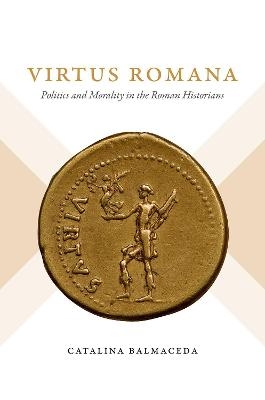
Virtus Romana
Politics and Morality in the Roman Historians
Seiten
2017
The University of North Carolina Press (Verlag)
978-1-4696-3512-5 (ISBN)
The University of North Carolina Press (Verlag)
978-1-4696-3512-5 (ISBN)
- Titel ist leider vergriffen;
keine Neuauflage - Artikel merken
Tracing how virtus informed Roman thought over time, Catalina Balmaceda explores the concept and its manifestations in the narratives of four successive Latin historians: Sallust, Livy, Velleius, and Tacitus. Balmaceda demonstrates that virtus in these historical narratives served as a form of self-definition which fostered and propagated a new model of the ideal Roman.
The political transformation that took place at the end of the Roman Republic was a particularly rich area for analysis by the era's historians. Major narrators chronicled the crisis that saw the end of the Roman Republic and the changes which gave birth to a new political system. These writers drew significantly on the Roman idea of virtus as a way of interpreting and understanding their past.
Tracing how virtus informed Roman thought over time, Catalina Balmaceda explores the concept and its manifestations in the narratives of four successive Latin historians who span the late Republic and early Principate: Sallust, Livy, Velleius, and Tacitus. Balmaceda demonstrates that virtus in these historical narratives served as a form of self-definition which fostered and propagated a new model of the ideal Roman more fitting to imperial times. As a crucial moral and political concept, virtus worked as a key idea in the complex system of Roman sociocultural values and norms which underpinned Roman attitudes about both present and past. This book offers a reappraisal of the historians as promoters of change and continuity in the political culture of both the Republic and the Empire.
The political transformation that took place at the end of the Roman Republic was a particularly rich area for analysis by the era's historians. Major narrators chronicled the crisis that saw the end of the Roman Republic and the changes which gave birth to a new political system. These writers drew significantly on the Roman idea of virtus as a way of interpreting and understanding their past.
Tracing how virtus informed Roman thought over time, Catalina Balmaceda explores the concept and its manifestations in the narratives of four successive Latin historians who span the late Republic and early Principate: Sallust, Livy, Velleius, and Tacitus. Balmaceda demonstrates that virtus in these historical narratives served as a form of self-definition which fostered and propagated a new model of the ideal Roman more fitting to imperial times. As a crucial moral and political concept, virtus worked as a key idea in the complex system of Roman sociocultural values and norms which underpinned Roman attitudes about both present and past. This book offers a reappraisal of the historians as promoters of change and continuity in the political culture of both the Republic and the Empire.
Catalina Balmaceda is associate professor of ancient history at Pontificia Universidad Catolica de Chile.
| Erscheinungsdatum | 31.01.2018 |
|---|---|
| Reihe/Serie | Studies in the History of Greece and Rome |
| Zusatzinfo | 3 halftones |
| Verlagsort | Chapel Hill |
| Sprache | englisch |
| Maße | 155 x 235 mm |
| Gewicht | 590 g |
| Themenwelt | Geschichte ► Allgemeine Geschichte ► Vor- und Frühgeschichte |
| Geschichte ► Allgemeine Geschichte ► Altertum / Antike | |
| ISBN-10 | 1-4696-3512-7 / 1469635127 |
| ISBN-13 | 978-1-4696-3512-5 / 9781469635125 |
| Zustand | Neuware |
| Haben Sie eine Frage zum Produkt? |
Mehr entdecken
aus dem Bereich
aus dem Bereich
auf den Spuren der frühen Zivilisationen
Buch | Hardcover (2023)
C.H.Beck (Verlag)
20,00 €
Konzepte – Methoden – Theorien
Buch | Softcover (2024)
UTB (Verlag)
39,90 €
Was Pompeji über uns erzählt
Buch | Hardcover (2023)
Propyläen (Verlag)
32,00 €


